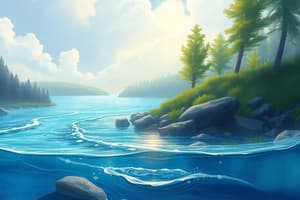Podcast
Questions and Answers
What are the four main processes involved in the water cycle?
What are the four main processes involved in the water cycle?
- Condensation, transpiration, infiltration, runoff
- Evaporation, condensation, sublimation, groundwater recharge
- Evaporation, precipitation, infiltration, runoff (correct)
- Transpiration, infiltration, groundwater recharge, runoff
How do rivers contribute to the geographical landscape?
How do rivers contribute to the geographical landscape?
- By reducing groundwater recharge
- By causing desertification
- By affecting soil composition and nutrient cycling (correct)
- By decreasing erosion patterns
What drives the process of evaporation in the water cycle?
What drives the process of evaporation in the water cycle?
- Earth's rotation
- Solar radiation (correct)
- Geothermal heat
- Magnetic fields
What role do river systems play in human society?
What role do river systems play in human society?
What happens to water after it falls from the sky during precipitation?
What happens to water after it falls from the sky during precipitation?
How do oceans interact with the water cycle?
How do oceans interact with the water cycle?
Flashcards are hidden until you start studying
Study Notes
Understanding Geography: Water Cycle, Rivers, Oceans
Geography encompasses various natural phenomena including the water cycle, rivers, and oceans. These aspects play crucial roles in shaping our planet's climate and environment.
Water Cycle
The water cycle is a continuous process involving the circulation of water among the Earth's atmosphere, surface waters, and underlying soils. It consists of four main processes: evaporation, precipitation, infiltration, and runoff. During evaporation, water changes from liquid to vapor, primarily driven by solar radiation. This water vapor rises and cools, condensing back into clouds during precipitation. Once water falls from the sky, some infiltrates into soils or evaporates back into the atmosphere, while the remaining water flows over land surfaces as runoff, eventually returning to the ocean.
Rivers
Rivers are large bodies of flowing water that play essential roles within the geographical landscape. They transport water from areas of high rainfall to regions where water is scarce, providing vital resources for both human populations and wildlife. River systems also help maintain ecological balance, affecting soil composition, groundwater recharge, erosion patterns, and nutrient cycling. Moreover, rivers have been integral to human society since ancient times, serving as transportation routes, sources of hydroelectric power, and locations for settlements.
Oceans
Oceans cover about 71% of Earth's surface and are crucial elements of geography due to their vast influence on climate regulation, weather patterns, ocean currents, marine ecosystems, tourism, and shipping industries. They act as global heat sinks, absorbing excess heat from land areas during hot seasons and releasing it back during cold seasons, contributing to global temperature stability. Oceans also regulate atmospheric oxygen levels by absorbing carbon dioxide from the atmosphere and releasing oxygen through photosynthesis by marine plants.
In conclusion, understanding geography requires knowledge about the water cycle, rivers, and oceans. These aspects are interconnected and significantly influence Earth's climate, ecosystems, and human societies.
Studying That Suits You
Use AI to generate personalized quizzes and flashcards to suit your learning preferences.




